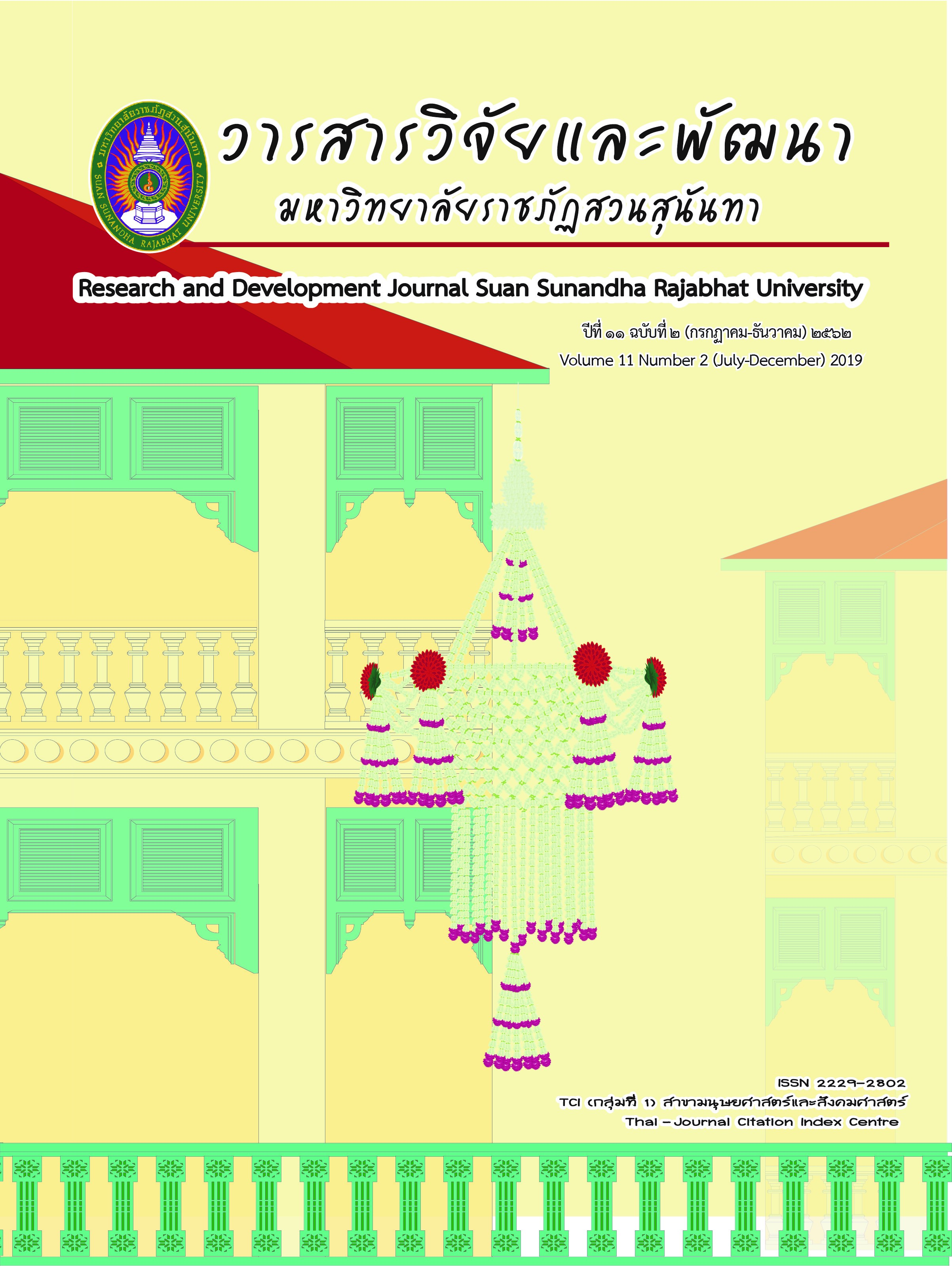ตัวแบบสมการโครงสร้างปัจจัยที่มีผลต่อผลสัมฤทธิ์ของการเข้าเป็นผู้สนับสนุนอีสปอร์ต: ในบริบทของการสื่อสารแบบปากต่อปากผ่านสื่ออิเล็คทรอนิกส์
คำสำคัญ:
ตัวแบบสมการโครงสร้าง, อีสปอร์ต, การเข้าเป็นผู้สนับสนุน, การสื่อสารแบบปากต่อปากผ่านสื่ออิเล็กทรอนิกส์บทคัดย่อ
จุดประสงค์ของการทำวิจัยในครั้งนี้เพื่อศึกษาปัจจัยที่ส่งผลต่อผลสัมฤทธิ์ของการเข้าเป็นผู้สนับสนุนในกิจกรรมการแข่งขันกีฬาอีสปอร์ต โดยใช้วิธีการของตัวแบบสมการโครงสร้างเป็นเครื่องมือในการวิเคราะห์และทดสอบสมมติฐาน ประชากรในการศึกษาครั้งนี้คือ ผู้เข้าชมการแข่งขันกีฬาอีสปอร์ตภายในประเทศไทย เก็บข้อมูลโดยการใช้แบบสอบถามเป็นเครื่องมือในการรวบรวมข้อมูลโดยมีจำนวนตัวอย่างทั้งสิ้น 385 คน สถิติที่ใช้ในการวิเคราะห์ได้แก่ ค่าเฉลี่ย ค่าร้อยละ ค่าเฉลี่ยส่วนเบี่ยงเบนมาตรฐานและตัวแบบสมการโครงสร้าง ผลการศึกษาพบว่าตัวแบบมีความสอดคล้องกับข้อมูลเชิงประจักษ์ (CMIN/df = 2.521, GFI = 0.882, NFI = 0.905, RFI = 0.889, IFI = 0.940, TLI = 0.930, CFI = 0.940 และ RMSEA = 0.063)
ผลการทดสอบสมมติฐานพบว่าปัจจัยที่ส่งผลต่อผลสัมฤทธิ์ของการเข้าเป็นผู้สนับสนุน คือ ด้านการมีส่วนร่วม ด้านเกียรติภูมิ และด้านความเหมาะสม มีอิทธิพลทางตรงเชิงบวกต่อการสื่อสารแบบปากต่อปากผ่านสื่ออิเล็กทรอนิกส์ที่ระดับนัยสำคัญทางสถิติ 0.05 และ 0.01 ส่วนการสื่อสารแบบปากต่อปากมีอิทธิพลทางตรงเชิงบวกต่อผลสัมฤทธิ์ของการเข้าเป็นผู้สนับสนุนในกิจกรรมการแข่งขันกีฬาอีสปอร์ตที่ระดับนัยสำคัญทางสถิติ 0.01
เอกสารอ้างอิง
Amis, J., Slacks, T., & Berrett, T. (1999). SportSponsorship as Distinctive Competence. European Journal
of Marketing. 33(3/4): 250-272.
BBC. (2017). esports: International Olympic Committee considering esports for future Games. [Online]. Available.:http://www.bbc.com/sport/
olympics/41790148.
Boerman, S. C. et.al. (2017). “This Post is Sponsored: Effects of Sponsorship Dieclosure on Persuasion Knowledge.” Journal of Interactive Marketing. 38(2017): 82.92.
Borowy, M. & Jin, D.Y. (2013). "Pioneering E-sport: The Experience Economy and the Marketing of Early 1980s Arcade Gaming Contests". International Journal of Communication. 7(13): 2254-2274.
Cunningham, G. et. Al. (2018). "eSport: Construct specifications and implications for sport management". Sport Management Review. 21(18): 1-6.
Elseidi, R. (2016). "Electronic word of mouth effects on consumers' brand attitudes, brand image and purchase intention: an empirical study in Eqyot. The Bussiness and Management Review. 7(5): 514-522.
Fahy, J. et. Al. (2002). Competetive advantage through sponsorship. European Journal of Marketing, [Online]. Available.: http://www.em eraldinsight .com/0309-0566.
GMR Marketing LLC. (2016). e-Sports Marketing: Start with the consumer.
Gwinner, K. (2003). A model of Fan Identification: Antecedents and Sponsorship Outcomes. Journal of Service Marketing. 17(3): 275-294.
Gwinner, K. (2009). IMAGE TRANSFER IN CORPORATE EVENT SPONSORSHIP: ASSESSING THE
IMPACT OF TEAM IDENTIFICATION AND EVENT-SPONSOR FIT. International Journal of
Management and Marketing. 2(1)Hamari, J. & Sjoblom, M. (2016). "What is eSports and why do people watch it?". Internet Research. 27(2), pp.211-232.
Hilvert-Bruce, Zorah. (2018). Social motivations of live-streaming viewer engagement on Twitch. Computer in Human Behavior. 84(18): 58-67.
Janthakij, W. (2004). The Influence of Being a Sponsor of the Event to the Brand Image. Thesis for Master’s degree in Advertisement, Faculty of Communication Arts. Chulalongkorn University.
Karhuahti, V. (2017). “Reconsidering Esport: Economics and Executive Ownership.” Physical Culture and Sport Studies and Research. : 43-53.
Khuong, M.N., Chau, N.T.K. (2017). “Factors of Event Sponsorship Affecting Customer’s Brand Trust and Word of Mouth: A Case of Toyota, Vietnam.” Journal of Economic, Business and Management. 5(2): 88-94.
Khuong, M.N., Chau, N.T.K. (2017). “The Effect of Event Sponsorship on Customer’s Brand Awareness and Purchase Intention: A Case Study of Toyota Vietnam.” Review of European Studies. 9(1): 148-157.
Kim, Y., Lee, H., Magnusen, M., & Kim, M. (2015). Factors Influencing Sponsorship Effectiveness: A Meta-Analytic Review and Research Synthesis. Journal of Sport Management.
Koronios, K., et.al. (2016). Sport Sponsorship: The impact of Sponsor Imageon Purchase Intention of Fans.
Lee, D., Schoenstedt, L.J. (2011). “Comparison of eSports and Traditional Sports Consumption Motives.” Journal of Research. 6(2): 39-44.
Lopez, M. & Sicilia, M. (2014). "Determinants of E-WOM influence: The Role of Consumers' Internet Experience". Journal of Theoretical and Applied Electronic Commerce Research. 9(1): 28-43.
Lu, Z. (2017). “From E-Heroin to E-Sports: The Development of Competitive Gaming in China". The International Journal of the History of Sport. 33(18): 2186-2205.
Paibunputhipong, S. (2013). The Influence of Being a Sport Sponsorship in Thailand Football Premier League Competition that Affects the Brand Recognition of Visitors. Thesis for Master’s degree in Advertisement. Faculty of Administration and Management. Bangkok University.
Sa'ait, N. et. Al. (2016). "The Effect of E-WOM on customer Purcahse Intention". International Academic Research Journal of Social Science. 2(1): 73-80.
Severi, E. et. Al. (2014). "The Impacts of Electronic Word of Mouth on Brand Equity in the Context of Social Media". International Journal of Bussiness and Management. 9(8): 84-96.
Smanuhatha, R. (2009). Brand Recognition Through Watching Motor Sports that Affect the Purchase Intention. Thumasart University.
Thiborg, J. & Jonasson, K. (2010) "Electronic Sport and its impact on future sport". Sport in Society. 2(13): 287-299.
Tsiotsou, R. & Alexandris, K. (2007). “Delineating the Outcomes of Sponsorship.” International Journal of Retail & Management. 37(4): 358-369.
Wanarat, S. (2017). A Structural Equation Model of Total Quality Management, Innovation and Supply Chain Performance. Business Administration and Economics Review. 14(1): 106-127
Wanitbancha, K. (2012). Statistical for Research. (6thed). Bangkok: Chulalongkorn University.
Wagner, M.G. (2006). "Computer Games and the Three Dimensions of Reading Literacy". Conference: Conference: Proceedings of the 2006 International Conference on Internet Computing & Conference on Computer Games Development, ICOMP 2006, Las Vegas, Nevada, USA, June 26-29, 2006.
Yang, Y. et. Al. (2018). Electronic word of mouth and hotel performance: A meta-analysis.Tourism Management. 67(18): 248-260.
ดาวน์โหลด
เผยแพร่แล้ว
รูปแบบการอ้างอิง
ฉบับ
ประเภทบทความ
สัญญาอนุญาต
บทความที่ได้รับการตีพิมพ์เป็นลิขสิทธิ์ของ สถาบันวิจัยและพัฒนา มหาวิทยาลัยราชภัฎสวนสุนันทา
ข้อความที่ปรากฏในบทความแต่ละเรื่องในวารสารวิชาการเล่มนี้เป็นความคิดเห็นส่วนตัวของผู้เขียนแต่ละท่านไม่เกี่ยวข้องกับมหาวิทยาลัยราชภัฎสวนสุนันทา และคณาจารย์ท่านอื่นๆในมหาวิทยาลัยฯ แต่อย่างใด ความรับผิดชอบองค์ประกอบทั้งหมดของบทความแต่ละเรื่องเป็นของผู้เขียนแต่ละท่าน หากมีความผิดพลาดใดๆ ผู้เขียนแต่ละท่านจะรับผิดชอบบทความของตนเองแต่ผู้เดียว





